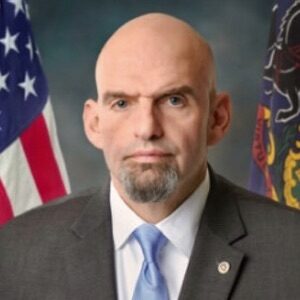Montgomery County Rep. Madeleine Dean and Sen. John Fetterman are urging President Joe Biden to invoke the 14th Amendment of the U.S. Constitution and unilaterally raise America’s debt ceiling. It is a move many legal scholars dismiss as both unserious and unconstitutional.
As America’s national debt approached $32 trillion, a 1917 law requires Congress to increase the amount the federal government could borrow if it were to keep issuing debt. As has happened in the past, Congress — the GOP-controlled House in particular — wants to use the debt ceiling vote to leverage a deal on political policies they support. Republicans want spending reductions in future budgets and work requirements for able-bodied adults receiving some welfare benefits.
After weeks of insisting there would be no negotiations and demanding a “clean” debt-ceiling bill, Biden is negotiating with Speaker of the House Kevin McCarthy. progressive Democrats like Dean and Fetterman are outraged. They want Biden to invoke the 14th Amendment and issue new debt without congressional approval.
The 14th Amendment says in part that “the validity of the public debt of the United States, authorized by law … shall not be questioned.” Progressives have occasionally argued, without evidence, that this provision means the president has the power to raise the federal debt limit without consulting Congress.
Fetterman recently publicly urged Biden to utilize this theoretical measure amid stalled debt ceiling talks. It has never been attempted before and would doubtlessly be subject to considerable litigation and a likely rebuke by the U.S. Supreme Court.
“This is the whole reason why the 14th Amendment exists, and we need to be prepared to use it,” Fetterman said. “We cannot let these reckless Republicans hold the economy hostage.”
Seemingly anticipating a negative Supreme Court reaction to the plan, Fetterman added. “And, if our unelected Supreme Court Justices try to block the use of the 14th amendment and blow up our economy, that’s on them.”
Dean, meanwhile, this month signed onto a letter from the Congressional Progressive Caucus urging Biden to “invoke the 14th Amendment of the Constitution” and “refuse to reward Republicans’ reckless refusal to raise the debt ceiling without preconditions.”
Neither Dean nor Fetterman responded to queries regarding their support of the plan. But one key opponent of their approach is Biden’s Treasury Secretary, Janet Yellen.
“What I would say, it’s legally questionable whether or not that’s a viable strategy,” Yellen said.
The issue is so far out on the legal fringe many constitutional scholars queried by DVJournal declined to speculate on the proposal’s feasibility.
“Not my area of Con Law, unfortunately,” one wrote.
“Sorry – beyond my expertise!” said another.
“Sorry, don’t know. Good luck!” wrote a third.
One exception was Michael Dimino, a professor, and expert in constitutional law at the Widener University Commonwealth Law School in Harrisburg, who has very clear views on the matter.
“The Fourteenth Amendment gives the president no authority unilaterally to raise the debt ceiling,” he told DVJournal.
“All the amendment says is that debts (except those incurred by the rebellious states) are valid,” he said. “It says nothing about how they are to be paid, and it certainly gives no authority to the president to override Congress’s decision about when or how to pay debts.”
“I do not know of any particular situation where it’s been used to this effect,” he said. “It seems like an absolutely frivolous argument.”
Other experts have weighed on the matter, with different scholars coming down on different sides of the constitutional question.
Jeffrey Rosen, a law professor at the George Washington University Law School, wrote during the 2011 debt fight that then-President Barack Obama stood a good chance of successfully using the 14th Amendment in such a way.
Rosen argued the Supreme Court would likely decline to hear the case at all, and the White House stood a chance of winning if it did.
“[T]he possibility of a lopsided victory should certainly embolden a constitutionally confident president to … throw down the gauntlet,” Rosen wrote.
On the same day, Rosen wrote those words, Dean of the UC Irvine School of Law Erwin Chemerinsky argued there was “no plausible way to read [the 14th Amendment] as providing the president the ability to increase the debt ceiling without congressional action.”
“The power of the purse — including the authority to tax, spend and borrow — is quintessentially legislative,” Chemerinsky wrote. “Not even a dire financial emergency would allow the president to take this over.”
The U.S. national debt on Tuesday stood at around $31 trillion, or about $250,000 per American taxpayer.
The only time since the nation’s founding when the debt balance was paid off was 1835 when President Andrew Jackson oversaw the successful termination of the national debt.
The government financed that achievement through land sales and tariffs.


